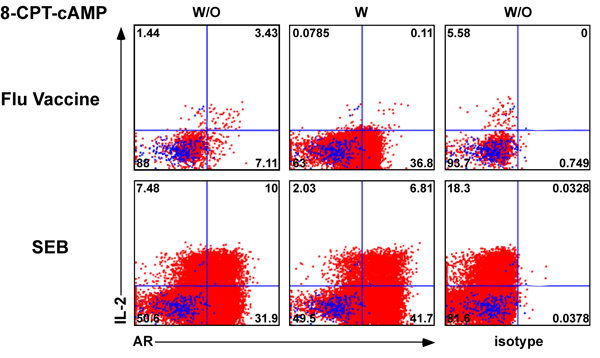URMC / Labs / Mosmann Lab / Projects / CD4 T Cells Derived Amphiregulin in Tissue Repair and Remodeling
CD4 T Cells Derived Amphiregulin in Tissue Repair and Remodeling
During the chronic inflammatory immune response, massive effector mediators derived from inflammatory cells caused severe tissue damage. Meanwhile, the process of tissue repair and remodeling are actively going on, in some cases, causes the pathogenesis of certain diseases, such as asthma. Amphiregulin (AR) is a member of the Epidermal Growth Factor (EGF) family. AR binds to EGF receptor and promote the proliferation of normal and malignant epithelial cells, fibroblasts and keratinocytes. This is potentially important for tissue remodeling and repair. Previously, our lab reported that AR is expressed in TCR activated mouse CD4 T cells, particularly in the Th2 cells. AR-deficient mice showed slower kinetics of clearance of the helminth parasite, Trichuris muris, which is cleared most effectively by Th2-biased responses. Lack of AR was associated with reduction of the hyperproliferation of gut villus epithelium cells that has been implicated in the removal of intestinal worms. Taken together, hemopoietic cells derived AR shows a potential role in the process of tissue repair and remodeling during the chronic inflammatory immune response, like asthma. To continue, we are interested in the production and regulation of AR in human CD4 T cells, especially the questions about which human CD4 T cells in which circumstances will express AR and whether CD4 T cells in asthmatic patients express more AR than non-asthmatic allergic or healthy subjects during TCR activation.

The expression of amphiregulin is induced by influenza vaccination and a cAMP agonist. Control: CD4+CD69 high; Antigen: CD4+CD69 high